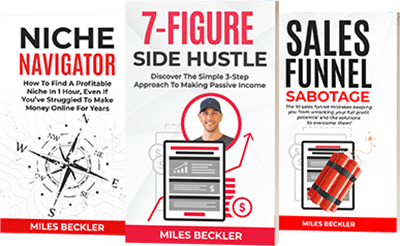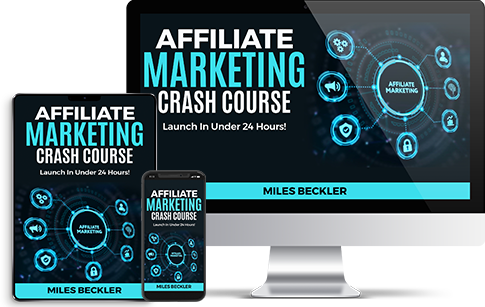In this blog post, I’m going to answer a common question.
Do you need a business license for affiliate marketing or to start an online business?
Ultimately, the answer to this question depends on your business, and on your local laws and regulations.
But you do need a baseline answer to get to work. And that is what we are going to discuss in this post.
Please keep in mind that I live in the United States. I do not know how the laws differ in other countries.
My knowledge does not extend beyond the U.S.
I am not a CPA, and I am not a lawyer. This article is not legal advice!
In fact, it is recommended that you work with both a good lawyer, and a good CPA to make everything perfect.
But now, let’s dive in!
Getting Started: Do Online Businesses Need A Business License?
The baseline answer to the question of “do you need a business license to start an online business” is simply this…
- If you are buying products wholesale, and then reselling them, you will probably need a business license
- If you are starting a simple affiliate website or selling information products, then you likely do not need a business license to get started
That is the simple, short answer.
But now, let’s talk about some of the other specifics, what else do you need to do to get started?
What You Will Need To Start an Affiliate Marketing Business
If you’re planning to sell affiliate products and earn commissions on them, the most important thing to make sure of is that you are up-and-up on your taxes.
Do you need a business license for affiliate marketing?
As an affiliate marketer, you are a sole proprietor. So you will need to fill out a W9 form for whoever is paying you the commissions for your affiliate market sales.
So, if you are selling affiliate products through Clickbank, through Amazon, through whoever… that affiliate service will have you fill out forms and you do not need a business license.
In the U.S, to fill out a W9, you will need to enter information like your name and your social security number.
The affiliate network will then track how much money you make… and at the end of the year, you will be supplied with the proper paperwork to show on your taxes what you earned in affiliate commissions.
This will usually be a 1099 form, which is an ‘independent contractor’ form.
Affiliate Marketing Is Not Like A ‘Regular’ Employment Job
Working with an affiliate network is a lot different from working with a regular ‘employer.’
So it is super important that you understand how it works.
When you work as an affiliate marketer, you are essentially operating your own business as an independent contractor.
And this is a lot different from being an ‘employee’ for a company.
For example, affiliate programs do not withhold taxes or provide you with health insurance.
They don’t pay your unemployment insurance… they don’t pay into your social security… etc.
So you have to make sure that you get these kinds of details squared away on your own!
You will want to save up money over the course of the year to pay your taxes, make sure that you can get health care covered without employer-supplied coverage, etc.
With all of that being said, there are some other pretty cool benefits to being an independent contractor as well.
The Benefits Of Being An Independent Contractor

There are actually many advantages to being an independent contractor.
Here are just a few of them.
- You are your own boss
- You usually have the opportunity to make more than hourly-wage workers
- It is possible that you may pay lower income taxes, depending on what your tax bracket is
Another great thing about being an independent contractor is that there are tax deductions for business owners in the United States, even if you’re working out of your own home.
How Do You Get Paid As An Independent Contractor?

If you are an affiliate marketer who is going through a service like Clickbank or Amazon, then getting paid by those companies is easy.
Usually they just mail you a check!
But if you’re doing freelance work or some other kind of independent, online digital marketing service… the easiest way to get paid is just to bill with Paypal!
Should You Stay A Sole Proprietor, Or Start A Corporation Or LLC?

Personally, I operated as a sole proprietor for years.
But eventually, I did turn my business into a corporation.
You might want to consult a lawyer to find the answer to this question for yourself, but here is some of the information that led to me making this decision for my business.
Why You Should Consider Starting A Corporation Or An LLC
There are many varied reasons to consider eventually turning your business into an LLC or a Corporation.
Some of them may not matter to you, while others may be very applicable to your specific situation.
At any rate, let’s go over a few of the most notable benefits.
- Tax benefits. You pay self-employment tax as a sole proprietor. But with a corporation or an LLC, you often get a better tax rate.
- You get some liability protection as a corporation or an LLC. As a sole proprietor, you and your business are one and the same. But as an LLC or a corporation, you and your business are separate entities.
- Tax time isn’t usually as difficult if you are running a corporation or LLC.
Starting Out As A Sole Proprietor Is No Problem… But You Will Want To Track Your Income And Expenses For Tax Purposes!

- Track all of your income religiously and meticulously, so that you know exactly how much your business made over the year
- Track every purchase you make for your business religiously and meticulous, so that you know exactly what your business expenses were during the year
- To make this super easy, set up a different bank account for your business, at a different bank, and do all of your business transactions through that bank
If you follow this advice, tax time will be a breeze… and you won’t be scrambling to figure out how much you made, what you spent, etc.
The Final Word On Starting A Corporation Or An LLC
At the end of the day, you need to do what is best for you and your business.
And the only way to know that, 100% for sure, is to talk to a lawyer and a CPA.
But personally, in my business, I found the idea of starting a corporation or an LLC to actually be unnecessary in the beginning.
In fact, in some ways, it could be considered a hindrance.
It costs money to start a Corp or an LLC.
So it made sense to me to start as a sole proprietor, and then to scale-up into one of these other models.
One Big Piece Of Advice To Help You Crush It With Bookkeeping

If I were going to go back in time and give myself one really good piece of advice, it would be to hire a really good tax person to help get off to the right start with your business bookkeeping.
This is probably more important than anything else, as mistakes made with taxes or bookkeeping in the early days of your business can definitely come back to haunt you later.
Keeping everything straight, keeping my records in order, and keeping my books even and up-to-date were far more important for me in the early days of my business than the idea of starting a corporation or an LLC were.
So…
- Get started, get up and running, and start blogging/YouTubing/Podcasting, etc.
- Start that separate bank account for your business, to save yourself a ton of trouble in the long run
- Hire a great tax person to help you when tax season comes around
- Eventually, when you are ready, incorporate or form an LLC
These are the steps I took, and they really helped me to get off to a great start as a sole proprietor in the business world.
Conclusion
At the end of the day, what matters the most is that you get started with your business.
You need to launch it and crush it… and then worry about the other stuff as it comes along.
Do you have questions about the business side of things that you haven’t been able to find answers to?
If so, hit me up in the comments and let’s talk about it!
In the meantime, keep creating and crushing it!
See you on the next one!
-Miles “Get It Done” Beckler!


